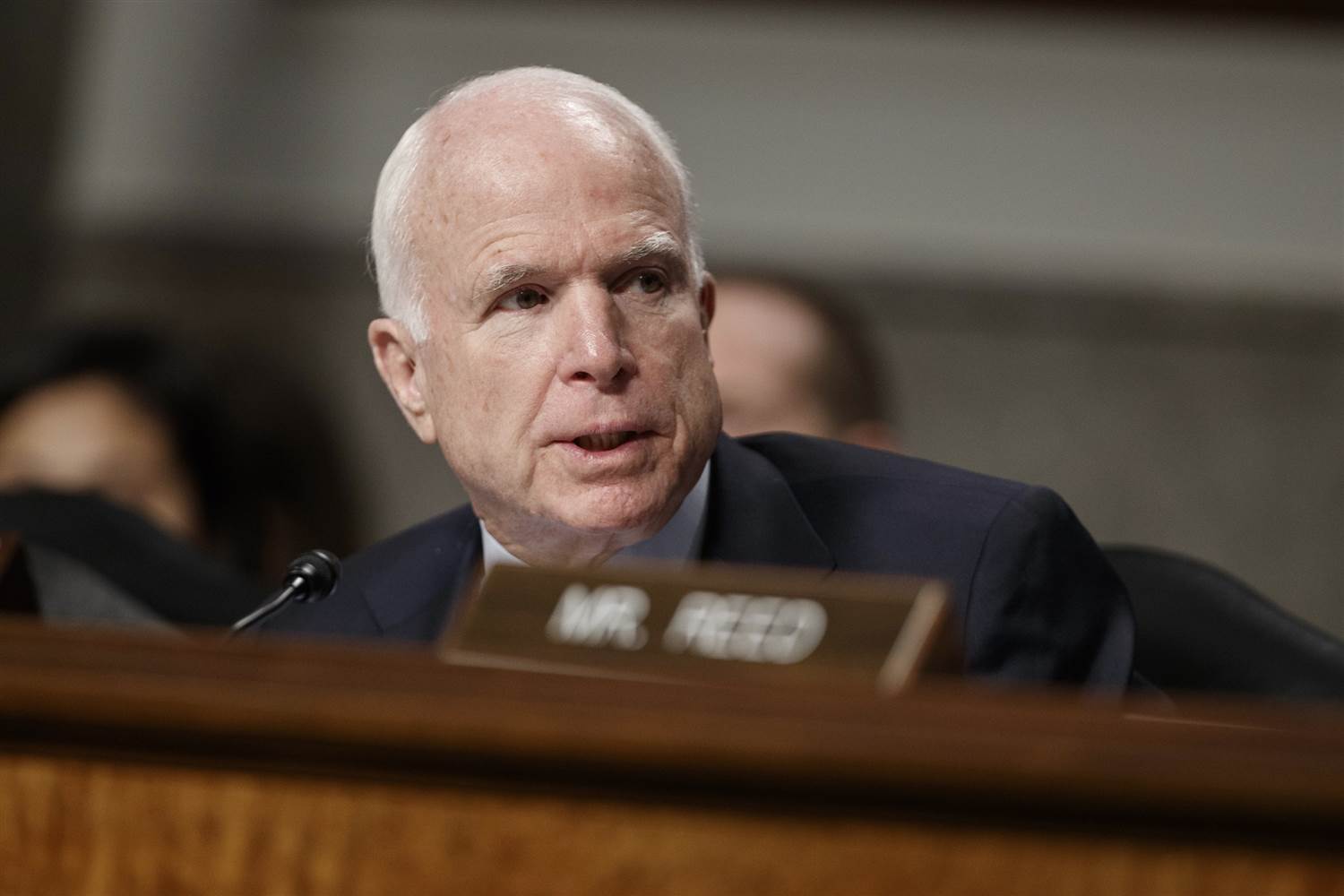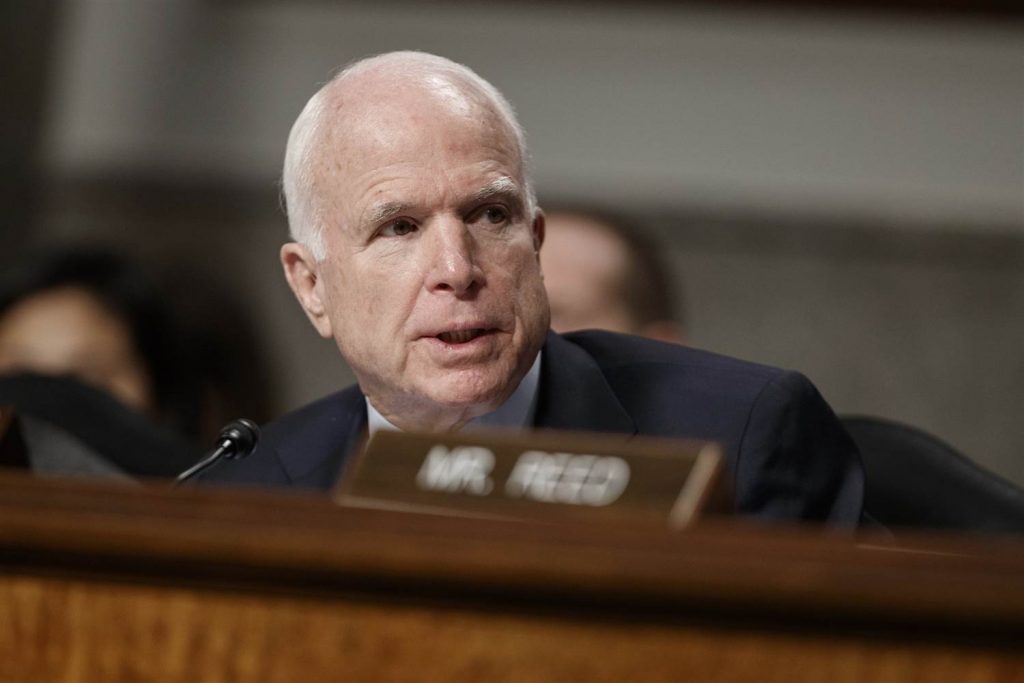
The Mayo Clinic said doctors diagnosed a tumor called a glioblastoma after surgery to remove a blood clot above McCain’s left eye last week. The senator and his family are considering treatment options, including a combination of chemotherapy and radiation, according to the hospital.
McCain, 80, has been away from the Senate this week, recovering from the surgery and undergoing tests. His office issued a statement describing him “in good spirits” and noting that his doctors say his underlying health is excellent — but not indicating when he will return to the Senate.
Glioblastoma is an aggressive type of brain cancer, and the prognosis for this kind of cancer is generally poor. Sen. Edward M. Kennedy (D-Mass.) survived less than 15 months after his was found in 2008. McCain’s doctors said the “tissue of concern” was removed during the blood-clot procedure.
McCain’s significance inside Congress is hard to overstate — and his absence, however long, will reverberate across the Capitol.
The Arizonan’s illness leaves Senate Majority Leader Mitch McConnell (R-Ky.) — and by proxy President Trump, who has openly mocked the Arizona senator — with 51 votes, the barest of majorities at a time when Republicans are divided on such issues as health care, taxes and defense spending.
McCain’s absence would also deprive the Senate of its moral conscience on many key issues, particularly in the ongoing investigation of the Trump campaign’s potential involvement in Russian meddling in the 2016 campaign.
Colleagues from both parties reacted swiftly to McCain’s announcement with sadness and encouragement. Trump exhorted McCain to “get well soon” and declared the senator a “fighter.” Former presidents Barack Obama and Bill Clinton both tweeted their good wishes.
McConnell said: “I know that he will face this challenge with the same extraordinary courage that has characterized his life. The entire Senate family’s prayers are with John, Cindy and his family, his staff, and the people of Arizona he represents so well.
“We all look forward to seeing this American hero again soon.”
McCain, a prisoner of war in Vietnam and a two-time presidential candidate, is known for his unfiltered opinions and willingness to buck Republican Party orthodoxy. Along with Sen. Lindsey O. Graham (R-S.C.), perhaps his closest friend in the Senate, McCain has become one of Trump’s leading Republican critics, particularly on issues of foreign policy and national security.
Sen. John Hoeven (R-N.D.) said the news of McCain’s diagnosis was announced during a meeting between GOP senators and White House staff on health care. Hoeven said the news left the group in “stunned disbelief.”
“It was very emotional,” Hoeven said. “I think for all of us he’s a special person.”
Graham also attended the meeting and told others there that he had spoken with McCain and described him as “resolved and determined.”
“He said, ‘I’m going to have to stay here a little bit longer and take some treatments, but I’ll be back,’ ” Graham said of McCain. “He said, ‘I’ve been through worse,’ and basically then we started talking about health care and the NDDA” — a reference to the National Defense Authorization Act.
McCain has staunchly defended Trump’s national security team — he has particular respect for Defense Secretary Jim Mattis and national security adviser H.R. McMaster. But McCain has criticized the president for campaigning on a promise to fortify the country’s defenses without, in his view, devoting enough money to the task.
McCain has also criticized Trump’s apparent affinity for Russia and its president, Vladimir Putin, warning that Russia is an enemy that should not be trusted and becoming one of the earliest Republicans to lend his support to a congressional investigation of Russia’s ties to the election.
“John McCain has always been a warrior. It’s who he is,” said House Speaker Paul D. Ryan (R-Wis.). “I know John is going to fight this with the same sheer force of will that has earned him the admiration of the nation. And all of us, not as Republicans or Democrats, but as Americans, are behind him. The prayers of the whole House are with Senator McCain and his family.”
McCain’s formal title is chairman of the Senate Armed Services Committee, but McConnell essentially deputized him after his second presidential bid, in 2008, to run all national security issues for Senate Republicans.
But McCain’s standing — from his stature borne of overcoming torture in Vietnam to his denunciations of Trump as a candidate and as president — reaches far across the aisle. He is an iconic figure as beloved by Democrats as Republicans.
Almost every major bipartisan deal of the last 15 years has come with McCain’s backing, on issues including immigration, outlawing torture and the Senate’s internal rules.
Democrats line up to travel with McCain overseas because foreign leaders treat him as if he’s a prime minister, winning audiences that are usually reserved for a secretary of state.
His fights with fellow senators have been legendary, but so have his dealmaking skills.
“Heartbreaking news,” wrote Sen. Chris Murphy (D-Conn.) on Twitter. He said he “traveled the world” with McCain and “learned a lot from him. Murphy added: “there is no one tougher.”
In a written statement she posted on Twitter, McCain’s daughter, Meghan McCain, said the news of her father’s illness has “affected every one of us in the McCain family.” She said they live with “anxiety about what comes next,” which they have endured before. McCain has a history of melanoma, a dangerous form of skin cancer.
She added, “it won’t surprise you to learn that in all this, the one of us who is most confident and calm is my father. He is the toughest person I know. The cruelest enemy could not break him.”
McCain’s absence could complicate the fate of the annual National Defense Authorization Act, massive legislation that McCain has played an outsized role in shepherding through Congress since he took over as chairman of the Senate’s Armed Services Committee in 2015.
From that perch, McCain has made a name for himself attempting to hold contractors to account over stalled projects while driving an overhaul of the acquisition process. He has pushed for greater investments to improve the quality and availability of materiel and training, an expansion of the U.S. military footprint abroad, particularly in hotspots like Afghanistan and Iraq, and an unprecedented focus on improving the country’s ability to safeguard against cyberthreats and hacking.
McCain was relentless in his criticism of Obama’s understanding of national security, accusing him of compromising the nation’s security by making nuclear deals with Iran and pulling troops out of Afghanistan and Iraq. But McCain was also open to working with the president to explore closing the detention facility at Guantanamo Bay. That effort ultimately failed.
McCain’s absence from the Senate this week came as GOP leaders struggled to bring their failing push to rewrite the 2010 Affordable Care Act to a conclusion. Leaders had intended to vote on a bill this week but postponed their plans late Saturday after McCain said he would be out recovering from the surgery to remove the blood clot.
On Monday, McConnell scrapped plans to vote on the bill altogether once it became clear it would not have the support to pass even with McCain in town to vote. McCain had voiced skepticism about the GOP “repeal and replace” plan. It was unclear that he would ever get to yes on it.
About 12,400 new cases of glioblastoma are expected in 2017, according to the American Brain Tumor Association. It is the most common of all malignant brain tumors, and a tumor that more commonly occurs in older adults than younger people.
Matthias Holdhoff, an associate professor at the Sidney Kimmel Comprehensive Cancer Center at Johns Hopkins, said the first step after a diagnosis is to surgically remove as much of the glioblastoma as possible. But that can be difficult; it is a tumor that spreads through extensions into the tissue, “more like a mesh work than a lump.”
“It’s not just a matter of the cancer, but where it is and what it’s doing to the patient,” said Chevy Chase, Md., oncologist Frederick Smith, speaking generally about glioblastomas and not specifically about McCain’s case. A blood clot over the eye tends to indicate the tumor was in the brain’s frontal lobe, which controls cognition among other things, he said.
Again speaking generally of patients with this diagnosis, they “might be fine for a number of months or even years.” But they are never cured.





